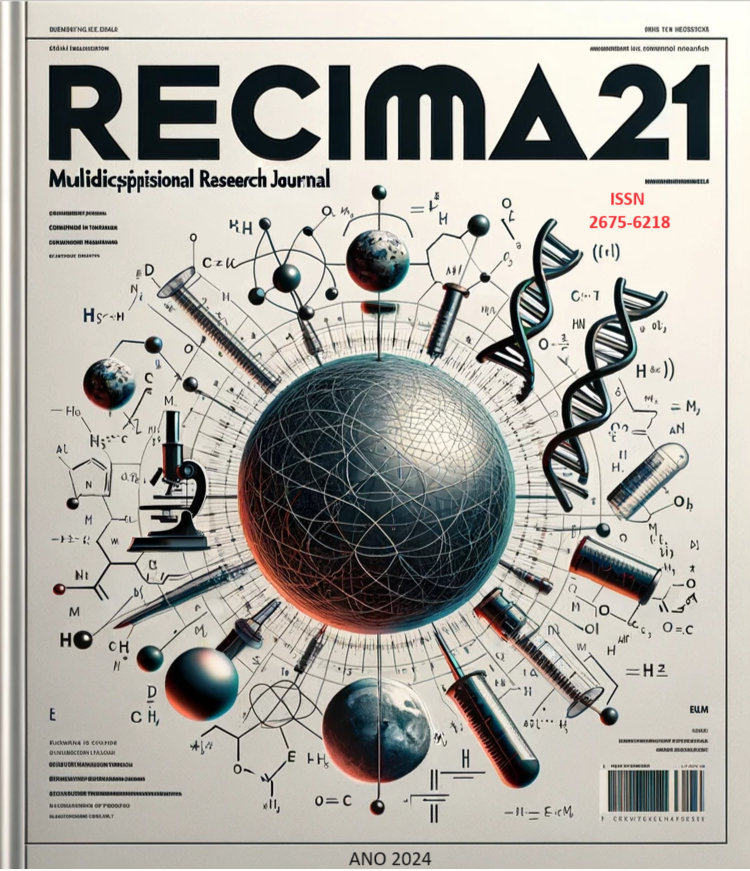NAPNE STRATEGIES FOR SCHOOL SUPPORT FOR STUDENTS WITH ADHD ON TECHNICAL COURSES INTEGRATED TO THE MEDIUM OF THE FEDERAL INSTITUTE OF NORTHERN MINAS GERAIS – MONTES CLAROS CAMPUS
DOI:
https://doi.org/10.47820/recima21.v5i10.5818Keywords:
ADHD in high school. Inclusion. Equality.Abstract
A study conducted at the Instituto Federal do Norte de Minas Gerais - Montes Claros campus aimed to verify the inclusive and pedagogical actions aimed at students with ADHD at the institution under study. For the analysis, we sought to identify, together with the Center for Assistance to People with Specific Needs (NAPNE), which presented reports indicating the number of students with disorders in technical courses integrated with high school at the IFNMG Montes Claros campus, two in the Computer Science course and one in the Building course. This is a qualitative and quantitative research, with exploratory bibliographic approaches. In addition to the NAPNE reports, queries were made to the E-SIC (Citizen Information System) and also to the SRE (Academic Records Secretariat), which allowed access to the records necessary to identify the individuals in the study. The authors were the clinical psychologist and researcher widely known for his work on ADHD, Russell Barkley; Clinical psychologist Russel J. Ramsey, who specializes in the diagnosis and treatment of ADHD in adolescents and adults. Articles and theses from CAPES and SCIELLO were used for the bibliographic review. The exploration of the research, it was found that NAPNE plays a fundamental role in supporting and welcoming students with ADHD in the institution and that it is necessary to construct information and effective teaching actions in order to promote inclusion and equal opportunities in IFS, ensuring that students with specific needs have access to quality education and adequate support for their academic and personal development.
Downloads
References
APA - AMERICAN PSYCHIATRIC ASSOCIATION. Manual diagnóstico e estatístico de transtornos mentais: DSM-5. Tradução: Maria Inês Corrêa Nascimento. 5. ed. Porto Alegre: Artmed, 2014.
ARAÚJO, M.; SILVA, S. Comportamentos indicativos do Transtorno de déficit de atenção e hiperatividade em crianças: alerta para pais e professores. Revista Digital, Buenos Aires, Año 9, n. 62, julio 2003, http://www.efdeportes.com/efd62/atencao.htm. Acesso em: 28 set. 2024.
BARKLEY, R. A. TDAH: transtorno do déficit de atenção com hiperatividade. Belo Horizonte: Autêntica, 2020.
BARKLEY, R. A.; BENTON, C. M. Vencendo o transtorno de déficit de atenção/hiperatividade: adulto. Porto Alegre: Penso,2016.
BEAUCHAMP, T.; CHILDRESS, J. Princípios de ética biomédica. 7. ed. São Paulo: Loyola, 2013.
BENCZIK, E. B. P.; BROMBERG, M. C. Intervenções na Escola. In: MATTOS, P.; ROHDE, L. A. Princípios e Práticas em TDAH. Porto Alegre: Artmed, 2003.
BOON, H. J. What do ADHD neuroimaging studies reveal for teachers, teacher educators and inclusive education? Child & Youth Care Forum, Cham, v. 49, p. 533-561, jan. 2020. https://doi.org/10.1007/s10566-019-09542-4. Acesso em: 08 set 2023. DOI: https://doi.org/10.1007/s10566-019-09542-4
BRASIL. Política nacional de educação especial na perspectiva da educação inclusiva. Brasília, DF: Ministério da Educação. 2008.
CARVALHO, R. E. Removendo Barreiras para a Aprendizagem: Educação Inclusiva. Porto Alegre: Artes Médicas, 2000.
GIL, A. C. Métodos e Técnicas de Pesquisa Social. 7. ed. São Paulo: Atlas, 2019.
GODOI, A. M. M.; GARRAFA, V. Leitura bioética do princípio de não discriminação e não estigmatização. Saúde e Sociedade, São Paulo, v. 23, n. 1, p. 157-166, 2014. https://doi.org/10.1590/S0104-12902014000100012. Acesso em: 08 set. 2023. DOI: https://doi.org/10.1590/S0104-12902014000100012
IFNMG. https://www.ifnmg.edu.br/napne-campusmoc/apresentacao. Acesso em: 28 set. 2024.
LACET, C.; ROSA, M. D. Diagnóstico de transtorno de déficit de atenção e hiperatividade (TDAH) e sua história no discurso social: desdobramentos subjetivos e éticos. Psicologia Revista, São Paulo, v. 26, n. 2, p. 231-253. https://doi.org/10.23925/2594-3871.2017v26i2p.231-253. Acesso em: 08 set 2023. DOI: https://doi.org/10.23925/2594-3871.2017v26i2p.231-253
MATTOS P, ABREU, P. B.; GREVET, E. O TDAH no adulto: dificuldades diagnósticas e de tratamento. In: ROHDE, L. A.; MATTOS, P. (Orgs.), Princípios e práticas em transtorno de déficit de atenção/hiperatividade. Porto Alegre: Artmed, 2003. p. 219-236.
MATTOS, P. No mundo da lua: perguntas e respostas sobre transtorno do déficit de atenção com hiperatividade em crianças, adolescentes e adultos. São Paulo: Lemos Editorial, 2007.
NARDI, A. E.; QUEVEDO, J.; SILVA, A. G. Transtorno de déficit de atenção/ hiperatividade: teoria e clínica. Porto Alegre: Artmed, 2015.
PAES, S. S. M.; SIMÃO-SILVA, D. P. Bioética e educação: a desigualdade de ensino aos alunos portadores de TDAH. In: Anais [...] 11 CONGRESSO BRASILEIRO DE BIOÉTICA. Curitiba, 2015. Disponível em: goo.gl/9FGRqv. Acesso em: 9 jun. 2023.
SANTOS, L. H.; FREITAS, C. R. 2016. TDAH, educação e cultura: uma entrevista com Ilina Singh (parte I). Interface: Comunicação Saúde Educação, Botucatu, v. 20, n. 59, p. 1077-1086. https://doi.org/10.1590/1807-57622016.0565. Acesso em: 08 set. 2023. DOI: https://doi.org/10.1590/1807-57622016.0565
SMITH, C.; STRICK, L. Dificuldades de Aprendizagem de A a Z. Porto Alegre: Artmed, 2001.
TEIXEIRA, G. Desatentos e hiperativos: manual para alunos, pais e professores. Rio de Janeiro: Best Seller, 2011.
WIENEN, A. W.; SLUITER, M. N.; THOUTENHOOFD, E.; DE JONGE, P.; BATSTRA, L. The advantages of an ADHD classification from the perspective of teachers. European Journal of Special Needs Education, v. 34, n. 5, p. 649-662, 2019. DOI: https://doi.org/10.1080/08856257.2019.1580838
Downloads
Published
How to Cite
License
Copyright (c) 2024 RECIMA21 - Revista Científica Multidisciplinar - ISSN 2675-6218

This work is licensed under a Creative Commons Attribution 4.0 International License.
Os direitos autorais dos artigos/resenhas/TCCs publicados pertecem à revista RECIMA21, e seguem o padrão Creative Commons (CC BY 4.0), permitindo a cópia ou reprodução, desde que cite a fonte e respeite os direitos dos autores e contenham menção aos mesmos nos créditos. Toda e qualquer obra publicada na revista, seu conteúdo é de responsabilidade dos autores, cabendo a RECIMA21 apenas ser o veículo de divulgação, seguindo os padrões nacionais e internacionais de publicação.













